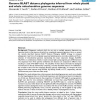2345 search results - page 102 / 469 » Comparing sequence scaffolds |
117
click to vote
BMCBI
2008
15 years 2 months ago
2008
Background: Modern proteomes evolved by modification of pre-existing ones. It is extremely important to comparative biology that related proteins be identified as members of the s...
112
click to vote
BMCBI
2008
15 years 2 months ago
2008
Background: Prediction of disulfide bridges from protein sequences is useful for characterizing structural and functional properties of proteins. Several methods based on differen...
109
click to vote
BMCBI
2006
15 years 2 months ago
2006
Background: Phylogenetic methods which do not rely on multiple sequence alignments are important tools in inferring trees directly from completely sequenced genomes. Here, we exte...
118
click to vote
BMCBI
2007
15 years 2 months ago
2007
Background: The pyridine nucleotide disulfide reductase (PNDR) is a large and heterogeneous protein family divided into two classes (I and II), which reflect the divergent evoluti...
134
click to vote
BMCBI
2007
15 years 2 months ago
2007
Background: Computational methods to predict transcription factor binding sites (TFBS) based on exhaustive algorithms are guaranteed to find the best patterns but are often limite...

